| Srl | Item |
| 1 |
ID:
164202


|
|
|
|
|
| Summary/Abstract |
FOR SEVERAL MONTHS, the world expert community has been actively discussing the obvious resurgence of the Russia-the U.S.-China "triangle." This happens every time when the key, or even "sacral," problem of international interaction - the problem of security - comes to the fore. The high level of confrontation inside two of the three sides of the "triangle" - the U.S. vs. Russia and China vs. the U.S. - predetermined this resurgence against the background of Donald Trump's non-orthodox and unyielding foreign policy.
|
|
|
|
|
|
|
|
|
|
|
|
|
|
|
|
| 2 |
ID:
152189
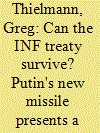

|
|
|
| 3 |
ID:
150109
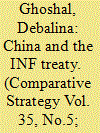

|
|
|
|
|
| Summary/Abstract |
Much has been said about the Intermediate Range Nuclear Forces (INF) Treaty; a treaty signed between the United States and the Soviet Union during the later stages of the Cold War. But, in the present times, both the United States and Russia have time and again accused each other of violating the treaty. Both parties have also suggested China be included in the treaty. This article discusses whether Beijing should be included in the INF Treaty and the factors associated with such entry.
|
|
|
|
|
|
|
|
|
|
|
|
|
|
|
|
| 4 |
ID:
162170
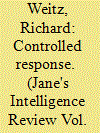

|
|
|
| 5 |
ID:
003048


|
|
|
|
|
| Publication |
New Delhi, Government Pub., 1988.
|
| Description |
135p.
|
| Contents |
B
|
|
|
|
|
|
|
|
|
|
|
|
Copies: C:1/I:0,R:0,Q:0
Circulation
| Accession# | Call# | Current Location | Status | Policy | Location |
| 034740 | 327.174/DIS 034740 | Main | On Shelf | General | |
|
|
|
|
| 6 |
ID:
175888
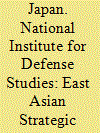

|
|
|
|
|
| Publication |
Tokyo, National Institute For Defense Studies, 2020.
|
| Description |
x, 217p.Pbk
|
| Standard Number |
9784864820844
|
|
|
|
|
|
|
|
|
|
|
|
Copies: C:1/I:0,R:0,Q:0
Circulation
| Accession# | Call# | Current Location | Status | Policy | Location |
| 059919 | 355.0095/JAP 059919 | Main | On Shelf | General | |
|
|
|
|
| 7 |
ID:
169459


|
|
|
|
|
| Summary/Abstract |
Whereas much of the debate about the demise of the 1987 Intermediate-range Nuclear Forces (INF) Treaty has focused on the European context and Russia’s alleged treaty violations, Asia looms large in the minds of proponents of the United States’s immediate withdrawal from the treaty. For many proponents, the fast-changing military balance in Asia and China's conventionally armed missiles constitute a sufficient cause for withdrawal. What does the end of the INF Treaty bode for the US-China military balance? This article argues that, although there are some near-term benefits for the US position in the conventional military balance with China, the advantages offered by prohibited missiles are minor and can be readily substituted by extant capabilities that are compliant with the treaty. Given the negative implications of the end of the INF Treaty for the future of arms control, the costs and benefits of withdrawing from the treaty require further examination; the military balance in Asia is an unpersuasive rationale for withdrawing from an important part of the arms-control architecture.
|
|
|
|
|
|
|
|
|
|
|
|
|
|
|
|
| 8 |
ID:
165626


|
|
|
| 9 |
ID:
137828
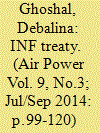

|
|
|
|
|
| Summary/Abstract |
Post the Cuban missile crisis, the arms race started to be viewed as a “necessary evil.”1 A predominant feature of the US-Soviet relationship comprised the efforts made by the two superpowers to indulge in nuclear arms reduction for strategic stability. The Intermediate Range Nuclear Forces (INF) Treaty was one such effort of the arms control measures. On December 8, 1987 President Reagan and General Secretary Gorbachev signed the treaty and agreed to a ‘double global zero’ in which both short range and intermediate range missiles would be eliminated.2 This paper aims to study the background of the treaty by briefly tracing the reasons for the signing of the treaty, the obligations of the treaty, the successes of the treaty, its limitations, and the implications of withdrawing from the treaty.
|
|
|
|
|
|
|
|
|
|
|
|
|
|
|
|
| 10 |
ID:
168079


|
|
|
| 11 |
ID:
063935


|
|
|
| 12 |
ID:
006037


|
|
|
|
|
| Publication |
Stanford, University Press, 1995.
|
| Description |
v,189p.
|
| Standard Number |
0840724933
|
|
|
|
|
|
|
|
|
|
|
|
Copies: C:1/I:0,R:0,Q:0
Circulation
| Accession# | Call# | Current Location | Status | Policy | Location |
| 037797 | 341.734/GEN 037797 | Main | On Shelf | General | |
|
|
|
|
| 13 |
ID:
164201
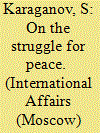

|
|
|
|
|
| Summary/Abstract |
THE U.S.'S WITHDRAWAL from the Treaty on the Elimination of Intermediate- and Shorter-Range Missiles (INF) may prove useful - however, only if it gets normal people throughout the world and, most importantly, many of us Russians to come out of years-long hibernation. This hibernation could be described as strategic parasitism.
|
|
|
|
|
|
|
|
|
|
|
|
|
|
|
|
| 14 |
ID:
171533


|
|
|
| 15 |
ID:
162727
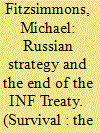

|
|
|
|
|
| Summary/Abstract |
The US withdrawal from the INF Treaty has risked shifting attention from Russia’s violations to America’s unilateralism. But it need not be a disaster for European security.
|
|
|
|
|
|
|
|
|
|
|
|
|
|
|
|
| 16 |
ID:
165627
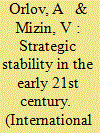

|
|
|
|
|
| Summary/Abstract |
ONE HUNDRED YEARS AGO, mankind entered the 20th century as the "golden age" of realized ideals of freedom and humanism. Reality proved to be different: this was the cruelest and the bloodiest period in the history of modern civilization.
|
|
|
|
|
|
|
|
|
|
|
|
|
|
|
|
| 17 |
ID:
152195


|
|
|
| 18 |
ID:
003100
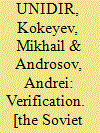

|
|
|
|
|
| Publication |
New York, United Nations, 1990.
|
| Description |
vi, 125p.
|
| Standard Number |
9290450428
|
|
|
|
|
|
|
|
|
|
|
|
Copies: C:1/I:0,R:0,Q:0
Circulation
| Accession# | Call# | Current Location | Status | Policy | Location |
| 034794 | 327.174/UNI 034794 | Main | On Shelf | General | |
|
|
|
|
| 19 |
ID:
175630
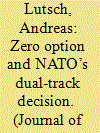

|
|
|
|
|
| Summary/Abstract |
An insufficiently understood paradox surrounded the NATO dual-track decision. This paradox was at the core of an almost classical high impact-low probability scenario which became reality with the INF Treaty of 1987, bringing NATO closer to a crisis of to be or not to be. NATO governments (except France) formally decided in 1979 that new long-range missiles in Europe were necessary but lacked political willpower to exclude the zero option, the possibility that NATO’s missile deployments may be obviated through arms control. The article analyses why this was the case, clarifies why this mattered, and draws policy implications from this crucial episode.
|
|
|
|
|
|
|
|
|
|
|
|
|
|
|
|